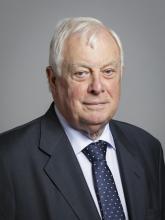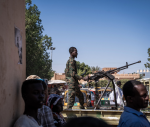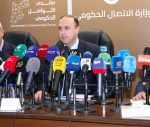You are here
Pope Francis in America
Sep 01,2015 - Last updated at Sep 01,2015
It’s a dollar to a cent that Pope Francis’ visit to the United States in September will be one of the biggest news stories of 2015.
Take the sheer number of American Catholics, add the diplomatic skill of the Vatican’s purple-and-scarlet-clad officials, then throw in Francis’ powerful statements on a variety of subjects — often antagonising America’s right wing in the process — and you have all the ingredients of an epic event.
Start with the diplomats.
Vatican officials catch their share of criticism, not least from Francis himself. But their ranks include intelligent top-rank officials — led by the Pope’s chief adviser, Cardinal Pietro Parolin — who are experienced at working quietly for peace and social justice in some of the most perilous parts of the world.
When such smart diplomacy is put at the service of an appealing and influential Pope, not to mention the 1.2 billion Catholics worldwide, the result is an engine for doing good that is more formidable than anything the world has seen for some time.
Anecdotes about Francis — from his propensity for making personal phone calls to those in distress to his decision to wash the feet of criminals, Muslims and women (to the horror of some churchmen) — ring true.
Such acts of graceful nobility have contributed to his reputation as a kind, approachable, charismatic and decisive leader — one who has proved to be highly appealing worldwide.
My personal experience with Francis suggests that his reputation is well deserved.
Though, at age 71, I may be a little old to indulge in hero worship, I cannot remember a public figure to whom I have warmed more.
He embodies the message, delivered in the Gospel of St Matthew’s account of the Sermon on the Mount: “Blessed are those who hunger and thirst for righteousness.” (Matthew 5:6)
The moral authority that Francis exudes makes his interventions in controversial contemporary issues — such as his condemnation of the Armenian genocide, Islamic jihadist violence, Mafia criminality and corruption in Italy, and the deaths of African and Middle Eastern migrants in the Mediterranean — extremely powerful.
Before and during his visit to the US, his views on three issues — none of which is without controversy in the US — will have a particularly strong impact.
First, Francis is helping end the decades-long stand-off between the US and Cuba.
Not only did Cardinal Parolin, formerly the Vatican’s man in Venezuela, play a key role in the restoration of diplomatic relations between the US and Cuba; Francis plans to visit the island on his way to the US.
But the thaw in US-Cuba relations has not been welcomed by all US politicians. Indeed, despite President Barack Obama’s apparent desire to end the pointless diplomatic freeze, some right-wing US politicians would, it seems, prefer a pariah to a potential partner off Florida’s coast.
The second key issue that Francis will address relates to the Israel-Palestine conflict — a fraught subject for the US, Israel’s most important ally.
The Vatican has announced its intention to sign a treaty that includes recognition of a Palestinian state.
Given Francis’ long record of friendship with Jews, and his understanding of their religion and culture, no Israeli politician can possibly condemn him as an anti-Semite.
Nonetheless, in parts of the American political establishment, Israel — specifically, Prime Minister Benjamin Netanyahu and his Likud Party — can do no wrong.
A US senator once told me: “We are all members of Likud here.”
The third issue — the most challenging for some American politicians, especially the most conservative among them — is Francis’ recent encyclical on environmental stewardship, climate change, and sustainable and fair economic development.
He clearly intends to put the full moral weight of his papacy behind the efforts to conclude a deal on climate change at the United Nations conference in Paris in December.
Obama’s recent statement on carbon dioxide emissions is clearly very much in line with the encyclical.
Francis will undoubtedly discuss the subject in his address to Congress, 30 per cent of whose members — including House Speaker John Boehner, a Republican — are Catholic.
Given that several of the leading candidates for the Republican presidential nomination — including Jeb Bush, Marco Rubio and Bobby Jindal — also are Catholic, Francis’ strong stance on climate change may create a serious political dilemma for some.
Already, some of the most conservative elements in American politics — backed by those, like the billionaire brothers David and Charles Koch, who benefit from inaction on climate change — are attempting to denounce Francis’ views.
Whereas the Catholic Church once tried to suppress science and reason, most notably in its condemnation of Galileo, it is now defending them, while conservative US politicians deny the facts.
The Pope is on the side of reason, as well as that of the angels.
In 1891, Pope Leo XIII produced “Rerum Novarum”, an encyclical on workers’ rights that fundamentally challenged the contemporary political discourse and approach to policy making.
Francis hopes to have a similar impact today, helping to catalyse action on climate change. In this manner, he hopes, the world can achieve sustainable growth that improves the lot of the poor, while safeguarding the planet on which we depend.
The 78-year-old Francis often talks of the limited time he has ahead of him. Most Catholics pray that this is not the case.
Given the positive impact that such a charismatic and forward-thinking Pope can have on the world, we should all share that hope.
The writer, the last British governor of Hong Kong and a former EU commissioner for external affairs, is chancellor of the University of Oxford. ©Project Syndicate, 2015. www.project-syndicate.org













